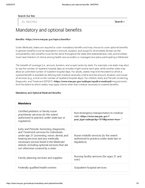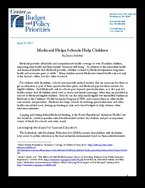0
Policy Brief
Community:
Jul 10, 2018
This brief explores how state Medicaid agencies have utilized a variety of federal authorities and delivery systems to increase access to supportive housing services and highlights important implementation considerations.
Authored by:
Topics: Cost effectiveness, Criminal justice, Data sharing, Funding, Health, Healthy homes, Homelessness, Housing, Legislation & Policy, Low-income, Medicaid / Medicare, Mental health, Partnerships, Substance abuse, Supportive housing
 Shared by Housing Is
Shared by Housing Is
Housing Is posted a
on Jul 10, 2018
This brief explores how state Medicaid agencies have utilized a variety of federal authorities and delivery systems to increase access to supportive housing services and highlights important implementation considerations.
0
Report
Community:
Jul 10, 2018
In December 2016, federal and state policymakers examined the intersection of unstable housing and negative health outcomes at a meeting convened in Washington, D.C., by the National Academy for State Health Policy (NASHP) with support from The Commonwealth Fund. The goal of the meeting was to identify concrete policy recommendations and actionable steps to align health and housing programs to ensure that people with high service needs receive the housing and supportive services they need to become and stay healthy. This report summarizes their findings and recommendations.
Authored by:
Topics: Child welfare, Cost effectiveness, Data sharing, Disabilities, Dual-generation, Health, Homelessness, Housing, Legislation & Policy, Low-income, Medicaid / Medicare, Partnerships, Seniors, Supportive housing
 Shared by Housing Is
Shared by Housing Is
Housing Is posted a
on Jul 10, 2018
In December 2016, federal and state policymakers examined the intersection of unstable housing and negative health outcomes at a meeting convened in Washington, D.C., by the National Academy for State Health Policy (NASHP) with support from The Commonwealth Fund.
0
Policy Brief
Community:
Jul 10, 2018
Under Medicaid, states are required to cover mandatory benefits and may choose to cover optional benefits. In general, benefits must be equivalent in amount, duration, and scope for all enrollees (known as the comparability rule); benefits must be the same throughout the state (the statewideness rule); and enrollees must have freedom of choice among health care providers or managed care plans participating in Medicaid.
Authored by:
Topics: Health, Low-income, Medicaid / Medicare
 Shared by Housing Is
Shared by Housing Is
Housing Is posted a
on Jul 10, 2018
Under Medicaid, states are required to cover mandatory benefits and may choose to cover optional benefits.
0
Policy Brief
Community:
Jul 10, 2018
This brief provides an overview of current federal standards and state options in Medicaid to help inform upcoming debates about increasing state flexibility in the program as part of efforts to restructure Medicaid financing.
Authored by:
Topics: Affordable Care Act, Cost effectiveness, Funding, Health, Legislation & Policy, Low-income, Medicaid / Medicare
 Shared by Housing Is
Shared by Housing Is
Housing Is posted a
on Jul 10, 2018
This brief provides an overview of current federal standards and state options in Medicaid to help inform upcoming debates about increasing state flexibility in the program as part of efforts to restructure Medicaid financing.
0
Report
Community:
Jul 10, 2018
HUD Administrative Data Linked with the National Health Interview Survey
Authored by:
Topics: Attendance, Child welfare, Data sharing, Dental, Health, Housing, Low-income, Medicaid / Medicare, Mental health, Metrics, Racial inequalities, Vision
 Shared by Housing Is
Shared by Housing Is
Housing Is posted a
on Jul 10, 2018
HUD Administrative Data Linked with the National Health Interview Survey
0
Policy Brief
Community:
Jul 10, 2018
Children’s HealthWatch's brief "asks two straightforward questions: If health starts at home, what are the healthcare and educational costs of unstable housing? Which policy solutions could create stable homes for healthier families?"
Authored by: Children's Health Watch
Topics: Asthma, Child welfare, Dental, Early childhood, Education, Foster care, Grade-level proficiency, Health, Healthy homes, Housing, Lead, Literacy, Low-income, Medicaid / Medicare, Obesity, Partnerships, Pre-natal, Preventative care, Racial inequalities, School-readiness, Stability, Vision, Youth
 Shared by Steve Lucas
Shared by Steve Lucas
Steve Lucas posted a
on Jul 10, 2018
Children’s HealthWatch's brief "asks two straightforward questions: If health starts at home, what are the healthcare and educational costs of unstable housing? Which policy solutions could create stable homes for healthier families?"
0
Report
Community:
Sep 1, 2017
A Snapshot of Housing Affordability for Healthcare Workers
Authored by: Kaitlyn Snyder and Janet Viveiros for National Housing Conference
Topics: Health, Healthy homes, Home visiting, Housing, Legislation & Policy, Low-income
 Shared by Housing Is
Shared by Housing Is
Housing Is posted a
on Jul 5, 2018
Kaitlyn Snyder and Janet Viveiros for National Housing Conference
A Snapshot of Housing Affordability for Healthcare Workers
0
Report
Community:
Dec 6, 2017
It adds to the growing body of evidence that addressing homelessness saves money elsewhere.
Authored by: J.B. Wogan for Governing the States and Localities
Topics: Cost effectiveness, Criminal justice, Health, Healthy homes, Homelessness, Housing, Legislation & Policy, Place-based, Preventative care, Research, Stability, West Coast
 Shared by Housing Is
Shared by Housing Is
Housing Is posted a
on Jul 5, 2018
J.B. Wogan for Governing the States and Localities
It adds to the growing body of evidence that addressing homelessness saves money elsewhere.
0
Report
Community:
Jun 1, 2017
Over the past year, the United States Conference of Mayors and the Brookings Institution, along with the Project for Public Spaces have worked together to capture a new model of growth that is emerging in cities and the particular roles that mayors can play.
Authored by: Julie Wagner, Jennifer S. Vey, Steve Davies, and Nathan Storring for Brookings Institute
Topics: Asset building, Community development, Cost effectiveness, Funding, Legislation & Policy, Place-based, Research
 Shared by Housing Is
Shared by Housing Is
Housing Is posted a
on Jul 5, 2018
Julie Wagner, Jennifer S. Vey, Steve Davies, and Nathan Storring for Brookings Institute
Over the past year, the United States Conference of Mayors and the Brookings Institution, along with the Project for Public Spaces have worked together to capture a new model of growth that is emerging in cities and the particular roles that mayors can play.
0
Interactive
Community:
Dec 21, 2017
Authored by: Domenick Lasorsa for the National League of Cities
Topics: Community development, Cost effectiveness, Housing, Legislation & Policy, Low-income, Metrics, Partnerships, Place-based, Research, Stability, Workforce development
 Shared by Housing Is
Shared by Housing Is
Housing Is posted a
on Jul 5, 2018
Domenick Lasorsa for the National League of Cities
0
Report
Community:
Mar 6, 2018
MDRC, a nonprofit, nonpartisan education and social policy research firm, released encouraging results from a demonstration, funded by Robin Hood, of two aligned interventions in New York City.
Authored by: MDRC
Topics: Early childhood, Education, Grade-level proficiency, Low-income, Metrics, Racial inequalities, Research, Youth
 Shared by Housing Is
Shared by Housing Is
Housing Is posted a
on Jul 5, 2018
MDRC, a nonprofit, nonpartisan education and social policy research firm, released encouraging results from a demonstration, funded by Robin Hood, of two aligned interventions in New York City.
0
Report
Community:
Jun 29, 2017
Violent-crime arrests drop by 33 percent for program participants.
Authored by: UChicago News
Topics: Child welfare, Criminal justice, Education, Low-income, Midwest, Mobility, Out-of-school time, Post-secondary, Racial inequalities, Research, Safety, Substance abuse, Workforce development, Youth
 Shared by Housing Is
Shared by Housing Is
Housing Is posted a
on Jul 5, 2018
Violent-crime arrests drop by 33 percent for program participants.
0
Report
Community:
Nov 1, 2017
Why do some neighborhoods appear able to launch effective local improvement initiatives, while others are more hampered by fragmentation and mistrust? Why can some communities mobilize diverse constituencies to influence public policy, while others cannot? Answers to these questions may be found in the specific patterns of collaboration that form among community organizations, and between these groups, schools, public agencies, and elected officials, according to MDRC, a preeminent social-policy research organization.
Authored by: MDRC
Topics: Asset building, Child welfare, Community development, Data sharing, Dual-generation, Education, Family engagement, Funding, Health, Housing, Legislation & Policy, Low-income, Metrics, Midwest, Mobility, Out-of-school time, Partnerships, Place-based, Preventative care, Research, Safety, Stability, Workforce development, Youth
 Shared by Mica O'Brien
Shared by Mica O'Brien
Mica O'Brien posted a
on Jun 29, 2018
Why do some neighborhoods appear able to launch effective local improvement initiatives, while others are more hampered by fragmentation and mistrust? Why can some communities mobilize diverse constituencies to influence public policy, while others cannot?
0
Interactive
Community:
Jan 8, 2018
An interactive tool that aggregates over 500,000 transactions from three programs that drive investment into underserved communities—the Low Income Housing Tax Credit (LIHTC), Community Development Financial Institutions (CDFI) and New Markets Tax Credit (NMTC) programs. The investments support a range of activities, from affordable housing to commercial real estate development, consumer and business lending, and more.
The CIE was built to show geographic comparisons and trends over time in a way that is easily customizable. For example, some users will view the full range of investment activity; others, only business and commercial real estate loans.
Authored by: Federal Reserve Bank of St. Louis
Topics: Housing, Midwest, Research
 Shared by Abra Lyons-Warren
Shared by Abra Lyons-Warren
Abra Lyons-Warren posted a
on Jan 11, 2018
Federal Reserve Bank of St. Louis
An interactive tool that aggregates over 500,000 transactions from three programs that drive investment into underserved communities—the Low Income Housing Tax Credit (LIHTC), Community Development Financial Institutions (CDFI) and New Markets Tax Credit (NMTC) programs.
0
Report
Community: Postsecondary
Dec 1, 2017
Authored by: American Academy of Arts & Sciences
Topics: Education
 Shared by Cassandra Brooks
Shared by Cassandra Brooks
Cassandra Brooks posted a
on Dec 12, 2017
0
Report
Community:
Aug 8, 2017
This report aims to bridge a knowledge gap between the affordable housing and healthcare fields that limits their ability to implement health and housing projects and partnerships. These two sectors have begun to realize how much they overlap, but while great work has been done to expose practitioners in both fields to information about their shared interests and common goals, the results to date have been relatively modest.
Authored by: Prepared by Mercy Housing and The Low Income Investment Fund for THE CALIFORNIA ENDOWMENT and THE KRESGE FOUNDATION
Topics: Cost effectiveness, Dual-eligibles, Health, Housing, Partnerships
 Shared by Abra Lyons-Warren
Shared by Abra Lyons-Warren
Abra Lyons-Warren posted a
on Aug 10, 2017
Prepared by Mercy Housing and The Low Income Investment Fund for THE CALIFORNIA ENDOWMENT and THE KRESGE FOUNDATION
This report aims to bridge a knowledge gap between the affordable housing and healthcare fields that limits their ability to implement health and housing projects and partnerships.
1
Report
Community:
May 1, 2017
State by State Chart
Authored by: ACF
Topics: Early childhood
 Shared by Marsha Basloe
Shared by Marsha Basloe
Marsha Basloe posted a
on May 4, 2017
2
Interactive
Community:
Feb 1, 2017
Suggestions for making supportive housing, both scattered site and single site, safe and developmentally appropriate for infants, toddlers, and preschoolers.
Authored by: ACF and CSH
Topics: Early childhood
 Shared by Marsha Basloe
Shared by Marsha Basloe
Marsha Basloe posted a
on May 4, 2017
Suggestions for making supportive housing, both scattered site and single site, safe and developmentally appropriate for infants, toddlers, and preschoolers.
1
Policy Brief
Community:
Apr 19, 2017
For eligible children, Medicaid pays for the medical services schools provide to students with disabilities so they can get an education.
Authored by:
Topics: Child welfare, Education, Medicaid / Medicare
 Shared by Steve Lucas
Shared by Steve Lucas
Steve Lucas posted a
on Apr 19, 2017
Medicaid provides affordable and comprehensive health coverage to over 30 million children. It also plays a little known but important role in supporting schools and making sure students, especially those with disabilities, get the care and services they need to succeed.
For eligible children, Medicaid pays for the medical services schools provide to students with disabilities so they can get an education.
0
Report
Community:
Feb 22, 2017
How Students Get to School in Denver, Detroit, New Orleans, New York City, and Washington, DC
Authored by: Student Transportation Working Group for the URBAN INSTITUTE
Topics: Education, Transportation
 Shared by Housing Is
Shared by Housing Is
Housing Is posted a
on Mar 29, 2017
Student Transportation Working Group for the URBAN INSTITUTE
How Students Get to School in Denver, Detroit, New Orleans, New York City, and Washington, DC
0
Report
Community:
Mar 2, 2017
In addition to detailing burdensome regulations, industry groups CLPHA, NAHRO, and PHADA raise concerns about recent MTW Notice and Comment solicitations.
Authored by: CLPHA, PHADA, and NAHRO
Topics: Housing
 Shared by Rich Bindell
Shared by Rich Bindell
Rich Bindell posted a
on Mar 3, 2017
In addition to detailing burdensome regulations, industry groups CLPHA, NAHRO, and PHADA raise concerns about recent MTW Notice and Comment solicitations.
0
Policy Brief
Community:
Feb 16, 2017
Supporting parents' efforts to help their children develop during the preschool years improves a child's school readiness, reduces behavior problems, enhances social skills, and promotes academic success.
Authored by: Bierman K, Morris P, and Abenavoli R for THE ROBERT WOOD JOHNSON FOUNDATION
Topics: Early childhood, Education, Family engagement, School-readiness
 Shared by Abra Lyons-Warren
Shared by Abra Lyons-Warren
Abra Lyons-Warren posted a
on Feb 16, 2017
Bierman K, Morris P, and Abenavoli R for THE ROBERT WOOD JOHNSON FOUNDATION
Supporting parents' efforts to help their children develop during the preschool years improves a child's school readiness, reduces behavior problems, enhances social skills, and promotes academic success.
0
Interactive
Community:
May 1, 2016
Authored by: CLPHA
Topics: CLPHA, Data sharing, Education, Housing, Metrics, Partnerships
 Shared by CLPHA Admin
Shared by CLPHA Admin
CLPHA Admin posted a
on Feb 7, 2017
We are pleased to share with you the following work product from the Council of Large Public Housing Authorities (CLPHA) as part of our Housing Is initiative, an effort to better intersect fields so they can more effectively help those they serve. This data sharing agreement template has been created in order to foster data sharing between housing and other sector organizations in order to improve efficiency, reduce duplication of efforts, and increase holistic care in order to improve educational and life outcomes for low-income children.
0
Interactive
Community:
May 1, 2016
Authored by: CLPHA
Topics: CLPHA, Data sharing, Education, Housing, Metrics, Partnerships
 Shared by CLPHA Admin
Shared by CLPHA Admin
CLPHA Admin posted a
on Jan 24, 2017
We are pleased to share with you the following work product from the Council of Large Public Housing Authorities (CLPHA) as part of our Housing Is initiative, an effort to better intersect fields so they can more effectively help those they serve. This data sharing agreement template for use with intermediary organizations has been created in order to foster data sharing between housing and other sector organizations in order to improve efficiency, reduce duplication of efforts, and increase holistic care in order to improve educational and life outcomes for low-income children.
0
Interactive
Community:
Nov 21, 2016
The Center for Neighborhood Technology’s Housing and Transportation (H+T®) Affordability Index provides a more comprehensive way of thinking about the true affordability of place. It presents housing and transportation data as maps, charts and statistics for 917 metropolitan and micropolitan areas—covering 94% of the US population. Costs can be seen from the regional down to the neighborhood level.
Authored by: CENTER FOR NEIGHBORHOOD TECHNOLOGY
Topics: Transportation
 Shared by CLPHA Admin
Shared by CLPHA Admin
CLPHA Admin posted a
on Nov 21, 2016
CENTER FOR NEIGHBORHOOD TECHNOLOGY
The Center for Neighborhood Technology’s Housing and Transportation (H+T®) Affordability Index provides a more comprehensive way of thinking about the true affordability of place.
 Shared by Housing Is
on Jul 10, 2018
Shared by Housing Is
on Jul 10, 2018
 Shared by Housing Is
on Jul 10, 2018
Shared by Housing Is
on Jul 10, 2018
 Shared by Housing Is
on Jul 10, 2018
Shared by Housing Is
on Jul 10, 2018
 Shared by Housing Is
on Jul 10, 2018
Shared by Housing Is
on Jul 10, 2018
 Shared by Housing Is
on Jul 10, 2018
Shared by Housing Is
on Jul 10, 2018
 Shared by Steve Lucas
on Jul 10, 2018
Shared by Steve Lucas
on Jul 10, 2018
 Shared by Housing Is
on Jul 5, 2018
Shared by Housing Is
on Jul 5, 2018

 Shared by Housing Is
on Jul 5, 2018
Shared by Housing Is
on Jul 5, 2018

 Shared by Housing Is
on Jul 5, 2018
Shared by Housing Is
on Jul 5, 2018
 Shared by Housing Is
on Jul 5, 2018
Shared by Housing Is
on Jul 5, 2018
 Shared by Housing Is
on Jul 5, 2018
Shared by Housing Is
on Jul 5, 2018

 Shared by Housing Is
on Jul 5, 2018
Shared by Housing Is
on Jul 5, 2018



 Shared by Abra Lyons-Warren
on Jan 11, 2018
Shared by Abra Lyons-Warren
on Jan 11, 2018
 Shared by Cassandra Brooks
on Dec 12, 2017
Shared by Cassandra Brooks
on Dec 12, 2017
 Shared by Abra Lyons-Warren
on Aug 10, 2017
Shared by Abra Lyons-Warren
on Aug 10, 2017
 Shared by Marsha Basloe
on May 4, 2017
Shared by Marsha Basloe
on May 4, 2017
 Shared by Marsha Basloe
on May 4, 2017
Shared by Marsha Basloe
on May 4, 2017
 Shared by Steve Lucas
on Apr 19, 2017
Shared by Steve Lucas
on Apr 19, 2017
 Shared by Housing Is
on Mar 29, 2017
Shared by Housing Is
on Mar 29, 2017
 Shared by Rich Bindell
on Mar 3, 2017
Shared by Rich Bindell
on Mar 3, 2017
 Shared by Abra Lyons-Warren
on Feb 16, 2017
Shared by Abra Lyons-Warren
on Feb 16, 2017
 Shared by CLPHA Admin
on Feb 7, 2017
Shared by CLPHA Admin
on Feb 7, 2017
 Shared by CLPHA Admin
on Jan 24, 2017
Shared by CLPHA Admin
on Jan 24, 2017
 Shared by CLPHA Admin
on Nov 21, 2016
Shared by CLPHA Admin
on Nov 21, 2016










